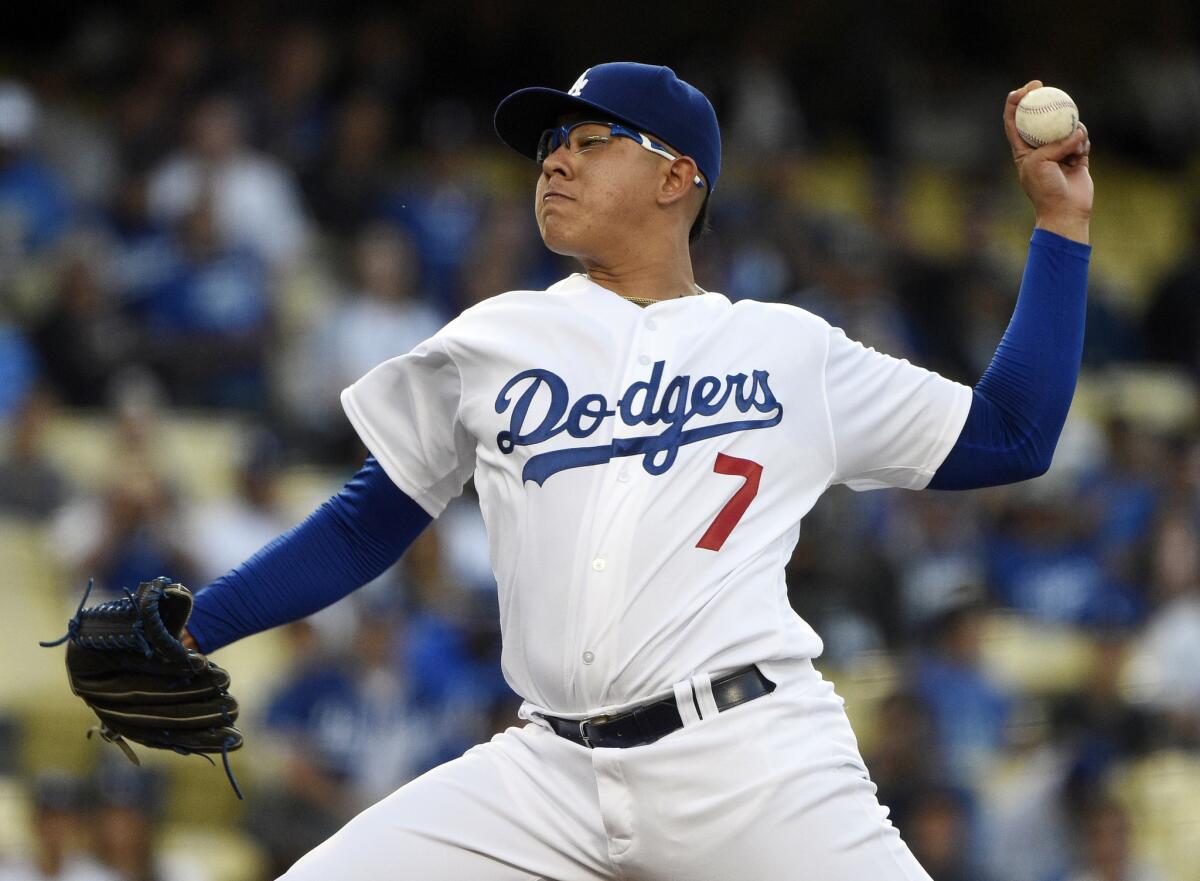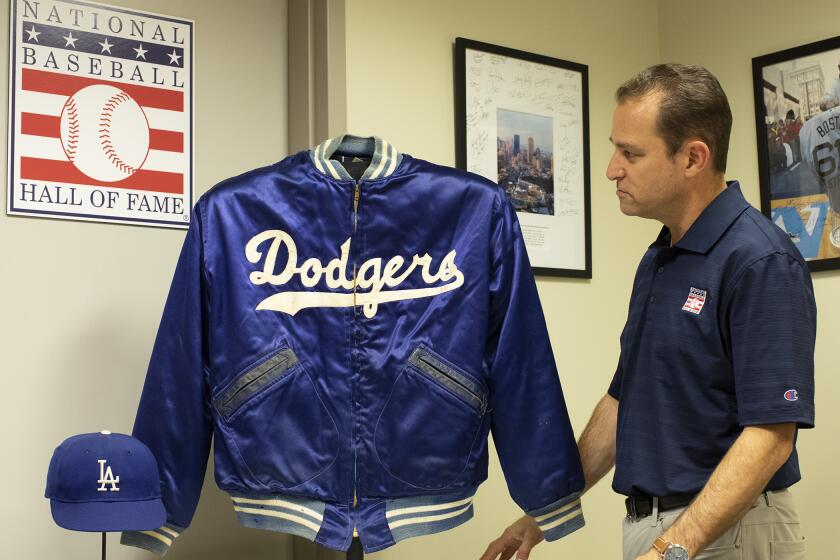Julio Urias shows grit but Dodgers are asking too much

- Share via
Before the game he was a teenager, sitting curled up in a clubhouse chair wearing horn-rimmed glasses and giant headphones and flipping a baseball like he was bored out of his mind.
When he took the mound he was a patriot, the loudspeakers blaring his requested song “El Sinaloense [The Sinaloan]” by Banda El Recodo, an anthem from his Mexican home state of Sinaloa.
Then, finally, after turning his back to the plate and pointing to the sky in prayer before his first career start at Dodger Stadium, Julio Urias became a pitcher.
A pitcher, a competitor, a fighter, the future.
He threw fastballs that thwacked, stared down Rockies who flailed, stranded runners on second base twice, brought the crowd to its feet in anticipation, ended three innings with punchouts that roared. After two clunker starts, baseball’s top pitching prospect finally showed what all the fuss is about by allowing one run on a misplayed fly ball with seven strikeouts and one walk.
It was tantalizing. But it was truncated. The 19-year-old required 86 pitches to last just four innings, reaching his limit early for a third consecutive start and placing yet another heavy burden on a bullpen that can hardly afford it.
He was a great for a bit, but he was seemingly gone in an instant, and by the time the game ended in a dramatic 4-3 Dodgers victory Tuesday, almost as poignant as Trayce Thompson’s walk-off homer was the fact that Urias had to walk off five innings earlier.
Urias might be the Dodgers future, but is that future now?
Afterward it was announced that Urias would get at least one more start, next Monday in Arizona, but even that was a bit of a surprise to some, and who knows what happens next?
The kid clearly is on the road to being a solid major league starter, but can a supposed contender afford to have someone with such pitch limitations take that journey on their pitching mound? As his adjustments against the Rockies proved, the kid is a fast learner, but should this education really be taking place four innings at a time for a team that is chasing a playoff spot?
Before Tuesday’s first pitch, Dodgers Manager Dave Roberts said the team needed more innings out of Urias, noting, “He needs to go deeper into the game.”
Yet, for the third straight start, he failed to go past five innings. In those starts Urias has pitched 112/3 total innings while, during those starts, the bullpen has pitched 131/3 innings.
In three starts, Urias has shown those flashes of brilliance, but overall has a 6.94 earned-run average with 16 hits allowed and three home runs allowed.
“There is a still a lot of growth taking place here,” Roberts said afterward when announcing Urias would stay in the rotation. “So we’re going to give him another one.”
Fans grumbled when he was removed from Tuesday’s game so early, but don’t boo Roberts for his short start. The Dodgers player development folks have kept such handcuffs on Urias during his four years with the organization that he’s not physically ready for more than 80-90 pitches.
So why is he here? Injuries. Lack of depth. Pure desperation. No, none of those reasons is the stuff of champions.
“I think if you look at our roster and what we envisioned for 2016, yeah, he wouldn’t be here right now,” acknowledged Roberts before the game. “But you have to adjust. The game calls for it. With injuries, his time is now.”
His time on Tuesday night began a bit wobbly, with the cheers of anticipation silenced within five minutes of the first pitch, after he allowed a double into the left-field corner by Ryan Raburn and a walk to Nolan Arenado.
But unlike in his major league debut in New York when he allowed the Mets three runs in the first inning, this time Urias settled down to strike out Carlos Gonzalez and Trevor Story on fastballs that had them swinging hard and missing.
After retiring the side in the second inning, Urias gave up a groundball hit to left field from DJ LeMahieu and an Arenado double over the head of a baffled Howie Kendrick in left field. But once again he settled, striking out Gonzalez to prevent further damage.
He struck out two of his last three hitters to end the fourth, but by then he was at pitch 86, and Louis Coleman was already warm in the bullpen, so he walked off the field for good.
In the back of the press box, legendary scout Mike Brito, who told Urias at age 14 that he was going to become a Dodger, was beaming.
“Tonight, this is what I saw all those years ago,” said Brito. “This is who he is. This is what he can do.”
But is he ready to do it here and now?
“It’s difficult, it is difficult,” said Roberts before the game. “To pitch up here at any age is difficult, especially for a 19-year-old young man.”
In a slice of nasty poetic justice, Urias’ next start is in Arizona next Monday against possibly, yeah, you guessed it, Zack Greinke.
So not only might the Dodgers have to face a former star whom they did not re-sign, but they could possibly do so with a teenage pitcher who is being rushed to the majors to help fill the void Greinke’s loss created.
“It was another dream come true making my debut here,” Urias said. “I’m feeling more comfortable every time.”
Hmmm. The only thing more interesting than Julio Urias’ future is how the Dodgers will handle it.
Twitter: @billplaschke
More to Read
Are you a true-blue fan?
Get our Dodgers Dugout newsletter for insights, news and much more.
You may occasionally receive promotional content from the Los Angeles Times.










